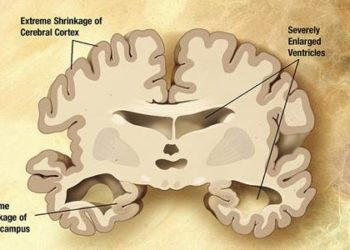Alzheimer disease in individuals with Down syndrome has similar variability in age of onset and mortality rate as autosomal dominant forms
1. This systematic review and meta-analysis demonstrated that the onset of Alzheimer disease in people with Down syndrome is as variable as in the autosomal dominant forms of the disease.
2. This data suggests that further life-prolonging interventions for individuals with Down syndrome will be limited until advancements in Alzheimer disease treatments are made.
Evidence Rating Level: 1 (Excellent)
Study Rundown: Down syndrome is a complex genetic condition with associated with multiple comorbidities, and is the most frequent genetic cause of intellectual disability. While life expectancy for people living with Down syndrome has increased due to notable improvements in healthcare, a consequence has been the emergence of age-related diseases including Alzheimer disease (AD). This systematic review and meta-analysis assessed whether the variabilities in symptom onset of AD in people with Down syndrome is similar to the autosomal dominant form of the disease and if there was any association with mortality. The study combined a meta-analysis with the assessment of mortality data from US death certificates, a total of 77 347 records, and from a longitudinal cohort study with 889 individuals from the Down Alzheimer Barcelona Neuroimaging Initiative (DABNI). Main outcomes included the age at onset, age at death and duration of AD dementia in people with Down syndrome. The estimated age of onset was found to be 53.8 years, the estimated age at death 58.4 years, and the estimated disease duration, 4.6 years. A drastic increase in median age at death of people with Down syndrome has been noted in the past 50 years, going from 1 year in 1968 to 57 years in 2019. Based on these findings, the authors conclude that further life-prolonging interventions for individuals with Down syndrome will be limited until advancements in Alzheimer disease treatments are made. A limitation of this study was that the CDC mortality data extracted from death certificates had incomplete reporting, particularly with regards to co-occurring conditions contributing to death. A strength, however, was that this study also analyzed mortality data from a prospective clinical cohort (i.e. DABNI) which was designed to study the natural history of AD in people with Down syndrome. The mortality data and findings suggest that Down syndrome is compatible with fully penetrant AD, and, as such, it should be recognized as a critical medical priority for people with Down syndrome.
Click to read the study in JAMA Network Open
Relevant Reading: Clinical and biomarker changes of Alzheimer’s disease in adults with Down syndrome: a cross-sectional study
In-Depth [systematic review and meta-analysis]: This study assessed whether the variabilities in symptom onset of AD in people with Down syndrome was similar to the autosomal dominant form of the disease. It combined a meta-analysis with the assessment of mortality data from US death certificates (n=77 347 case records coded for people with Down syndrome between 1968 to 2019; 37 900 [49%] female) from a longitudinal cohort study (n=889 individuals; 46% female; 3.2 [2.1] years of follow-up) from the Down Alzheimer Barcelona Neuroimaging Initiative. Initially, 7004 studies were title and abstract screened, of which 52 met the final inclusion criteria. Outcomes of interest were extracted from studies from 8 different countries. A meta-analysis was conducted to investigate the age at onset, age at death and duration of AD dementia in people with Down syndrome. Pooled estimates with corresponding 95% CIs were calculated using random-effects meta-analysis with the DerSimonian-Laird method. The estimated age at onset was 53.8 years (95% CI, 53.1-54.5 years; n=2695); the estimated age at death, 58.4 years (95% CI, 57.2-59.7 years; n=324); and the estimated AD duration, 4.6 years (95%CI, 3.7-5.5 years; n=226). After using a combined mean (SD) estimate age of onset of 54.4 (7.1) years from the systematic review, results were contrasted with data obtained from US death certificates from 1968 to 2019. The study identified a remarkable increase in the median age at death of people with Down syndrome in the past 50 years, from 1 year in 1968 to 57 years in 2019. This study had considerable statistical heterogeneity in the meta-analysis (I2=60%-87%), however there was high consistency in the mean values of the outcomes across studies.
Image: PD
©2022 2 Minute Medicine, Inc. All rights reserved. No works may be reproduced without expressed written consent from 2 Minute Medicine, Inc. Inquire about licensing here. No article should be construed as medical advice and is not intended as such by the authors or by 2 Minute Medicine, Inc.







